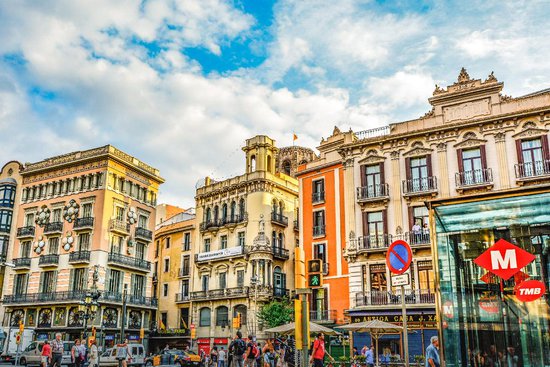Study Biology in France
Find your program
Use this search box and filters to browse Erudera's study program database.
Erudera's Complete Guide to Studying Biology in France
The field of biology is the best choice for those who have a passion for studying living organisms, the history of animal and plant life, and much more. Due to the broad scope of this field and the many opportunities that the French government offers for biology students, you will find in France the most up-to-date courses, an amazing student environment, and some of the most motivating lecturers. The combination of these positive factors will prove to be life-changing for anyone who chooses to study biology in France.
Reasons to Study Biology in France
High-quality Programs
The field of biology is constantly developing, and new fields constantly emerging. French universities have tried their best to stick to the top of innovation and deliver even the most recent courses in biology. Some of the many courses that you can choose to study in France include Anatomy; Genetics; Evolution; Physiology; Food Safety; Plant Physiology; Zoology; Virology; Agronomy; Pharmacology; Embryology; Photobiology; Cell Biology; Biochemistry; Immunology; Paleozoology; Radiobiology, etc.
An Excellent Destination for Science Graduates
One of the many reasons that make France a great choice for those with a passion for biology is that the country makes an excellent destination for science graduates. Many discoveries in the field of biology have been made by French influential scientists that have managed to bring home Nobel Prizes. So, as a biology graduate, you will have the opportunity to tackle many challenges and contribute to sectors that are at the forefront of scientific research and development.
Lab and Fieldwork
Getting to practice what you learn in classes is important for anyone that wants to be successful, especially for students of biology. Universities in France know the importance of both lab and fieldwork that is why they create opportunities for you to experience your education in a new light. This will be helpful to you because you will have a better understanding of what you are learning, you will develop skills and gain more confidence but most importantly you will have an enjoyable experience.
Requirements
Requirements to study biology in France vary depending on factors such as the level of education you plan to pursue, the university you plan to attend, and the country you come from. Despite these factors, some requirements are general to each university and each international student is expected to meet them. These requirements include:
For undergraduate studies
- High school diploma or certificate
- Transcripts and their official translation
- Personal statement
- CV
- English or French language proficiency(depending on the language of instruction of your university)
For postgraduate studies
- Bachelor’s degree
- Work experience
- Letters of recommendation
- Letter of motivation
- CV
- English or French language proficiency
Note that upon applying you must submit the official translations of all documents that have not been issued in the French language.
Application Process
All students applying to their first year of undergraduate studies in French universities must apply through the French national platform - ParcoursUp. A very important part of the application process is submitting your application before the deadline. Due to the fact that all students apply through the national platform, the deadline is the same for all universities. Applications usually open in December and close in January or March.
Students coming from a third country are obliged to file for a preliminary request for admission between November and January (prior to the commencement of the academic year). This application is sent to the French embassy in your home country.
Note that ParcoursUp is not the only way you can apply to French universities. You can also apply to the universities of your choice directly. Usually, all information about the requirements and application procedure can be found on the websites of the universities, or it can be found by contacting the university.
Degree Duration: How Long Does It Take to Study Biology in France?
The length of your degree will depend on the level of study you plan to undertake. Considering that France has adopted the Bologna Process same as many other European countries, its higher education system follows the timeline below:
- Bachelor’s Degree - Three to four years
- Master’s Degree - One to two years
- Ph.D. - Three to six years
During the first years of your biology studies, you will focus on more generalized subjects and then gradually take more specialized courses such as genetics, anatomy and physiology, animal behavior, microbiology, biochemistry, cancer biology, nutrition, cell biology, ecology, plant biology, evolution, zoology, etc.
Tuition Fees: How Much Does It Cost to Study Biology in France?
Studying biology in France may cost you a lot less than it would in many other developed countries of the world. In France’s public universities, tuition fees are quite low because of the financial support they receive from the French government. However, tuition fees in private universities on the other hand are higher, but still quite affordable.
In public universities you can expect to pay around EUR 170 ($203) per year for a bachelor’s degree, EUR 243 ($290) per year for a master’s degree, and EUR 380 ($454) per year for a doctorate. In private universities, tuition fees vary from one institution to the other, so once you choose which university you would like to attend you can check for their biology program tuition fees.
Biology Career Prospects in France
Normally, your career path will depend on the branch of biology you choose to study. A biology degree can lead to studying living organisms, finding cures for different diseases, or tackling environmental problems such as endangered species or climate change. Considering that biology is a field with quite a large scope, industries in which you can find employment are numerous. Some of these industries include but are not limited to:
- Education
- Healthcare
- Research
- Environmental Conservation
- Biotechnology
- Government and Policy
- Business
- Economy
- Science Publishing
The salary you will receive after graduating from one of France’s universities will also depend on the branch of biology you choose to study. However, the salary of a biology graduate will range from EUR 54,000 ($64,454) to EUR 163,000 ($194,555).





